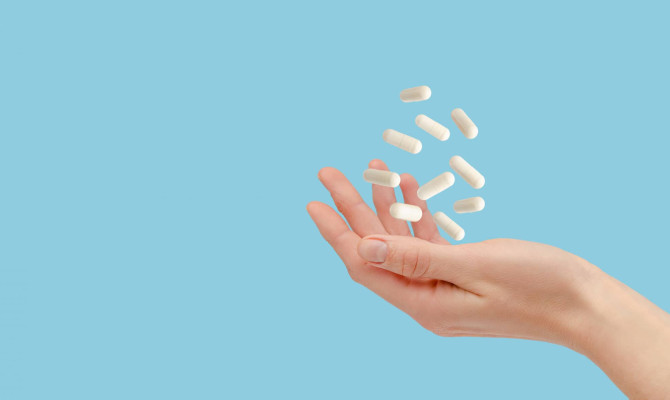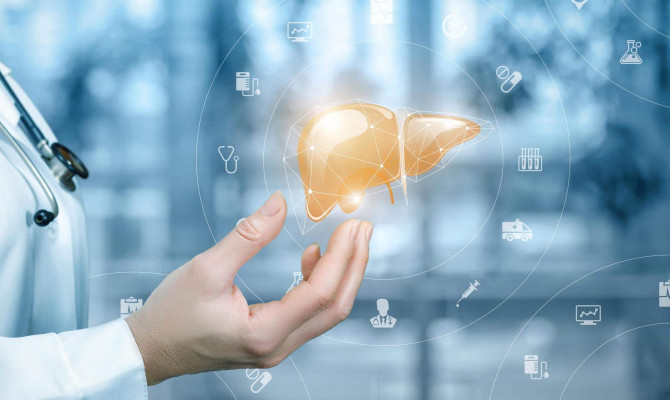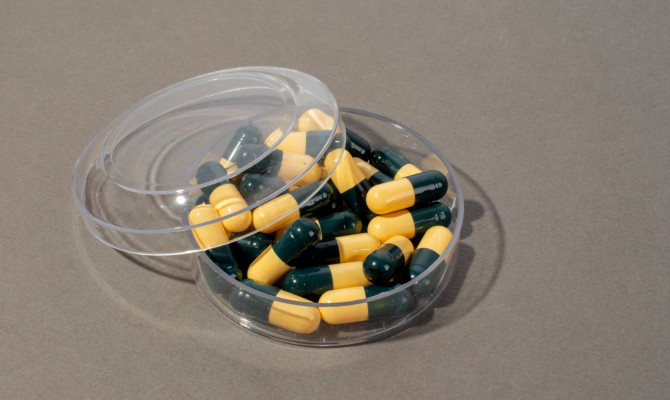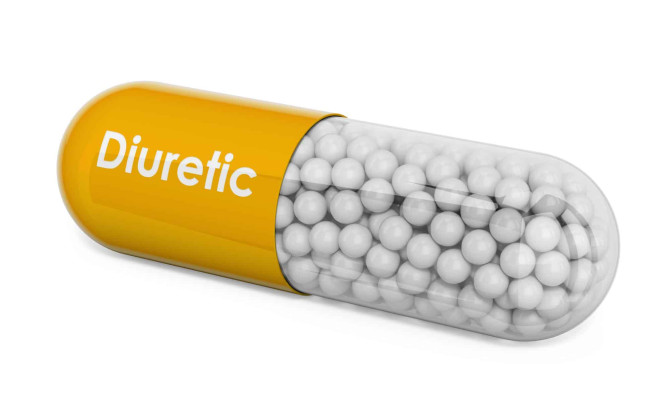All About Antibiotics: Uses, Types, and Resistance

- Antibiotics
- 17 Aug 2023
Overview
What are Antibiotics?
Antibiotics are the substances produced by microorganism which inhibits the growth or destroys other microorganism which are in low concentrations1Overview| Researched based study from Medlineplus.gov Antibiotics means anti-against biotic means life (against life of bacteria )

Mechanism of work
There is a long never ending list of antibiotics, their unique mechanism and specific areas in the body where they act but among all, the two main families include bacteriostatic and bactericidal where the drug enters the bacterial cell wall, cell membrane and shut their protein synthesis factory leading to inhibition or killing the organism2Overview| Researched based study from Nfid.org ,3Overview| Researched based study from Nlm.nih.gov
Bacteriostatic
- These are the agents which suppress the growth of bacteria. like tetracycline and clindamycin.
Bactericidal
- These are the agents which kill the bacteria. like Penicillin.
- Some Antibiotics may act as Bacteriostatic in low doses and Bactericidal in high doses like Erythromycin.
Types
Types of Antibiotics
Antibiotics are classified in multiple ways
On the basis of effect
To make it simple we can classify it as broad and narrow spectrum antibiotics4Types| Researched based study from Nhs.uk
Broad spectrum
- These are called broad spectrum because they suppress multiple groups of bacteria (gram positive, gram negative) these antibiotics are non specific and can kill majority of bacteria, they are used when the organism causing disease is not known or multiple organism of different groups are involved.
- For example Tetracycline and chloramphenicol
Narrow spectrum
- These antibiotics are very specific, they are used when the organism causing disease is known
- For example penicillin G only has effect on gram positive group organism and Aminoglycosides only has effect on gram negative group of organism.
Types on the basis of Chemical nature
Depending upon their chemical structure there are many group of antibiotics below is a list of few important and routinely used once along with their generic names.
- Penicillin (amoxicillin).
- Macrolides(azithromycin).
- Cephalosporins( cephalexin).
- Fluoroquinolones (ciprofloxacin).
- Beta lactams with enhanced activity (Amoxiclav).
Uses
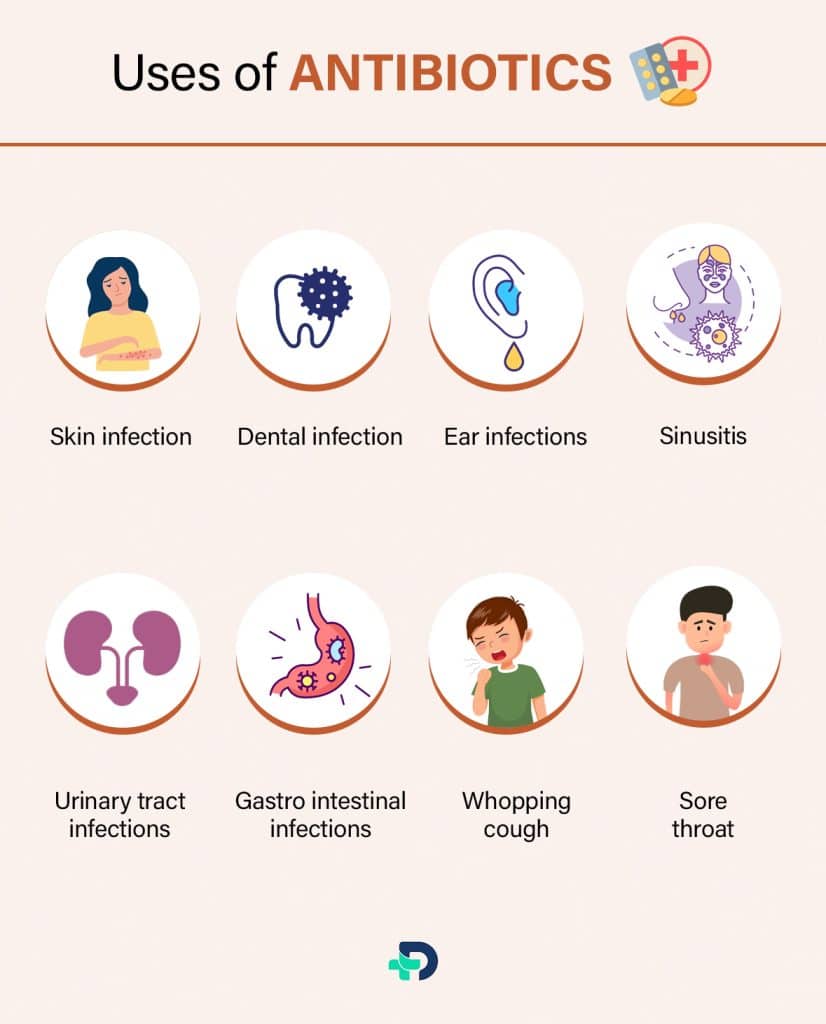
Uses of Antibiotics
There are millions and millions of bacteria living in and on our body, majority of them are harmless, some are even beneficial like lactobacillus the bacteria which help in digestion, some are harmful which can even prove deadly. Thankfully antibiotics work as boon to get rid of those infections.
Below are few conditions where antibiotics are use for Treatment
- Skin infection
- Dental infection
- Ear infections
- Sinusitis
- Urinary tract infections
- Gastro intestinal infections
- Infections involving brain like Meningitis
- Whopping cough
- Sore throat.5Uses| Researched based study from Cdc.gov
Antibiotics are also used prophylactically in healthy individuals
- When a healthy individual comes in contact with patient having syphilis or gonorrhea.
- It prevent infection in high risk patients like individuals receiving immunosuppressants( which decrease the immune activity) or with AIDS.5Uses| Researched based study from Cdc.gov
- Surgical prophylaxis : prevention of wound infections following surgery is very vital to limit morbidity hence a dose of antibiotic in pre operative period is very helpful.
Precautions
Precautions
Antibiotics are very useful resource for mankind and has to be used very judiciously.
- Doctors prescription along with additional instructions should be followed religiously.
- They usually start to work in a few hours or less. Even if your symptoms have subsided, still complete your course.
- Never share your medications with others, This could lead to some unwanted side effects.
- Discard your medications safely.
- Make it a routine, take the medication at the same time or at set intervals during the day or night hours
Antibiotics in Pregnancy
As far as possible, antibiotics should be avoided in pregnancy, very few have been known to be safe in pregnancy like penicillin and some cephalosporins. many of the antibiotics should be avoided due to their adverse effects.6Precautions| Researched based study from Nlm.nih.gov
- Don’t take medications unless it’s truly necessary.
- If you can, try to avoid starting medication during the first trimester. This is when the fetus develops its body, so this is also the time when iatrogenic teratogenicity is most likely to happen.
- Choose a safe drug, which is usually an older one that has been used in pregnant women before and proved efficacy and no teratogenic effect ( harmful effect on the fetus).
- Streptomycin, kanamycin, and tetracycline are antibiotics that should not be taken at all during pregnancy.
- Discourage the use of OTC (over-the-counter) drugs.
- Use the smallest amount that’s effective.
Side effects
Side effects of Antibiotics
As with any medicines, antibiotics can cause adverse or side effects too, Like:
- Loose stools
- Nausea
- Vomiting
- Blotting
- Rashes
Some specific side effects are
- Staining of teeth and sensitivity to sunlight with tetracyclines.
- Change in color of body secretions like sweat and urine with rifampicin.
- With prolonged use of certain antibiotics, fungal infections of different parts of the body can be seen.7Side effects| Researched based study from Nhs.uk
Allergic reactions with Antibiotics
Unintentional immune-associated reactions, frequently brought on by antibiotics. such as 8Side effects| Researched based study from Nlm.nih.gov
- Anaphylaxis
- Severe organ-specific skin reactions
- Face puffiness
- Rashes
- Itching
Gastrointestinal abnormalities were some other allergic symptoms noted among some group of people, like:
- Vomiting
- Loose stools
Drug Interactions
Antibiotic Drug Interactions
Sometimes, antibiotic medications can interact with other drugs or herbal substances. This may have a result that is unexpected Ask your doctor or chemist if you want to make sure that your medications are safe to take with your antibiotics.
Some major interactions are as follow:9Interactions| Researched based study from Nhs.uk
With alcohol
Drinking alcohol while on medications like metronidazole or tinidazole can cause side effects, such as:
- Feeling uneasy
- Stomach ache
- Irregular heartbeat
- Migraine
- Dizziness
- Feeling drowsy
A broad spectrum antibiotic called linezolid can be affected by fermented alcoholic beverages, such as wine, beer etc. Doxycycline may also have decreased efficacy in people with habits of regular drinking of alcohol.
With OCP’s (oral contraceptive pills)
- Many antibiotics like rifampicin can reduce the efficacy of the oral contraceptive pills, the couple who takes rifampicin like drugs should use other contraceptive method like condoms and implants
With Dairy products
- If you are taking tetracyclines, you should avoid dairy products like milk curd, butter, cheese because they might interfere with the way the medicine works.9Interactions| Researched based study from Nhs.uk
Overuse & Underuse
What are the effects if Overuse and underuse the Antibiotics?
Effects of Overuse
- Overuse of antibiotics leads to development of a new infection called super infection.
- It occurs due killing of the good bacteria which is present in the gut and altering the natural intestinal microflora, respiratory tracts and urinary tracts.
These usually occurs due to
- Use of broad spectrum antibiotics.
- In AIDS patients.
- Patients with low immunity.
Prevention of superinfection
- Narrow spectrum and specific antibiotics should be used.
- Judicious use of antibiotics.
- Appropriate drug for appropriate duration is a must because prolonged usage is common cause of superinfection.
- Curd is like an natural antibiotic, it has many lactobacillus (a bacterial family) which enhances the growth of good bacteria in the gut which eventually helps in digestion and restore gut microflora
Under use of antibiotics
- Most people make the mistake of abruptly quitting their antibiotic as soon as their symptoms go better.
- When a drug is used insufficiently, certain bacterial organisms survive and become resistant to it. This means that when the treatment is used again, it has no effect.
Antibiotic Resistance
What is Antibiotic Resistance?
It is the unresponsiveness of the microorganism( bacteria)to the antibiotic agent. Resistance may be natural or acquired 10Antibiotic Resistance| Researched based study from Cdc.gov
- Antimicrobial resistance occurs when bacteria and fungus get smart enough to beat the drugs that are meant to kill them. this means that the germs aren’t killed, so they keep growing.
- Infections that are resistant can be hard or even impossible to heal.
- Antimicrobial resistance could affect people at any point in their lives, as well as the medical, veterinary, and agribusiness This has made it one of the most important health issues in the world.
- If antibiotics and antifungals stop working, we won’t be able to treat illnesses or stop them from being a threat to public health.
- Even with all of the advancements, we will eventually return to the pre-antibiotic age, when even minor RTAs (road traffic accidents) that resulted in infection-related deaths.
Prevention of antibiotic resistance:
- Use of antibiotic only when necessary.
- Selection of appropriate by your doctor is very important.
- Correct dose and duration of management to be followed.
- Combination of drugs to be used to delay the development of resistance as we do in tuberculosis.10Antibiotic Resistance| Researched based study from Cdc.gov
Takeaway
Takeaway Points
- Antibiotics are medications used for treating bacteria infections, this invention has decreased the death rate and morbidities very drastically.
- Always remember antibiotics is never a choice in case of viral infections like flu, cough etc.
- Antibiotics should only be used when prescribed by your doctor.
- Any untoward reaction following popping up of antibiotics should be reported to your doctor immediately.
- Don’t stop antibiotics immediately after getting relief from symptoms,complete the course.
- Don’t continue using antibiotics for long, it will cause more harm than benefit. If we don’t use the available drugs against bacteria effectively, the unseen germs will be able to defeat us, situation will be the same like early 19th century, where many minor infections lead to fatalities.
Any feedback on this article?
 This Articles content was accurate
This Articles content was accurate Very Informative Article
Very Informative Article I have a question or a comment
I have a question or a comment
 This article contains inaccurate content
This article contains inaccurate content This article was not helpful
This article was not helpful I have a question or a comment
I have a question or a comment
We appreciate your helpful feedback!
Checkout our social pages
References
-
Medline plus
Antibiotics | Overview
-
National Foundation for Infectious Diseases
7 Key Facts You Should Know About Antibiotics | Overview
-
National Library of Medicine
Action and resistance mechanisms of antibiotics: A guide for clinicians | Overview
-
National Health Service
Antibiotics | Types
-
Centers for Disease Control and Prevention
What is an antibiotic? | Uses
-
National Library of Medicine
Antibiotics in Pregnancy: Are They Safe? | Precautions
-
National Health Service
Antibiotics-An overview | Side effects
-
National Library of Medicine
Antibiotic allergy | Side effects
-
National Health Service
Antibiotics | Interactions
-
Centers for Disease Control and Prevention
Antimicrobial Resistance | Antibiotic Resistance

























